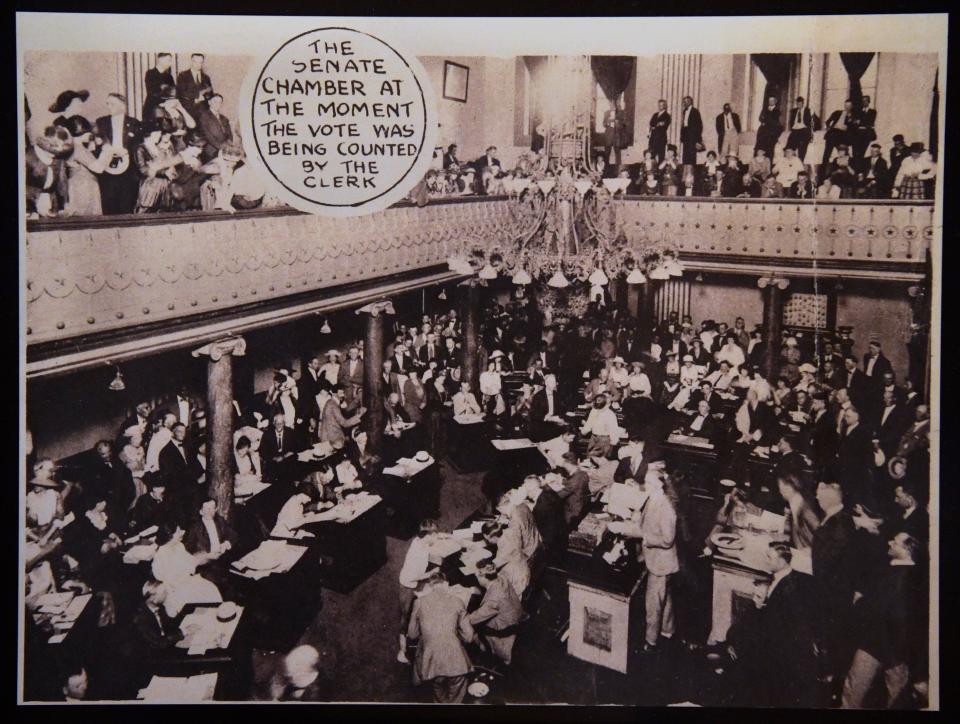How Tennessee became the pivotal state to ratify women's suffrage | Opinion
Editor's note: This is a regular feature on issues related to the Constitution and civics written by Paul G. Summers, retired judge and state attorney general.
The 19th Amendment is often referred to as the “Women’s Suffrage Amendment.” It was ratified by the states on August 18, 1920. Our Constitution was ratified in 1789.
Women had no federal constitutional right to vote. A few states periodically gave women states’ voting rights, but these were sporadic. 131 years later, Tennessee became the 36th state to ratify the 19th Amendment. Women now had the constitutional right to vote in all elections.
Amendment XIX: “The right of citizens of the United States to vote shall not be denied or abridged by the United States or by any State on account of sex. Congress shall have power to enforce this article by appropriate legislation.”
Hear more Tennessee Voices: Get the weekly opinion newsletter for insightful and thought provoking columns.
It took 130 years to get women’s suffrage
If you are affected by a law, you should have a say in choosing those who pass them. Most all laws affect women; some may affect women more than men. But women formerly had no right to have a say in them.

Laws affect the home, and women were not consulted. Women were usually more astute in home and children’s well-being than were men, yet they were not consulted nor had a say.
Women should not be second class citizens. They should be allowed to opine on matters of concern. Opposition to women having the right to vote was mostly based on tradition and emotion and had nothing to do with reason.
Even many women were not convinced that women should vote. That said, it still took over 130 years for women to finally achieve voting equality via the 19th Amendment.
Sign up for Latino Tennessee Voices newsletter:Read compelling stories for and with the Latino community in Tennessee.
Why some women opposed suffrage
One way to amend the Constitution is passing a resolution through the U. S. Congress where boththe Senate and House pass a resolution by 2/3 vote in each body. Then three-fourths of the states’ legislatures must approve the resolution before it is ratified.
When the 19th Amendment resolution was sent to the states, we had 48 states. 35 states had ratified, and the resolution was sent to Tennessee.
My grandfather, Julius B. Summers, was the youngest senator in the Tennessee legislature. He called and asked his wife, my grandmother Beulah, for advice on the resolution.
Beulah, a college-educated teacher, exclaimed, “Jule, women don’t need to be involved in all that government business…”, or words to that effect.
She recommended that he vote “nay” in opposition to the Amendment. Although Senator Summers followed his wife’s advice and counsel, the Tennessee Senate voted in favor of the resolution.
Sign up for Black Tennessee Voices newsletter:Read compelling columns by Black writers from across Tennessee.
Harry Burn listened to his mother
In the state House of Representatives, a young representative, Harry T. Burn, called his mother, Febb E. Burn, for advice on how to vote. The House was tied. His mother advised him to vote “aye” to give women the constitutional right to vote. The youthful representative followed his mother’s advice.
The House passed the resolution. The 19th Amendment to the U. S. Constitution was ratified by Tennessee’s vote. We have been and are proud of Tennessee’s ratification of this Amendment.
We are thankful that the East Tennessee representative followed his mother’s advice. Women finally had a constitutional right to vote in all elections after thirteen decades.
Paul G. Summers is a lawyer. He is a former appellate and senior judge, district attorney general, and the attorney general of Tennessee. Raised in Fayette County, Judge Summers resides in Holladay and Nashville.
This article originally appeared on Nashville Tennessean: Tennessee became the pivotal state to ratify women's suffrage

